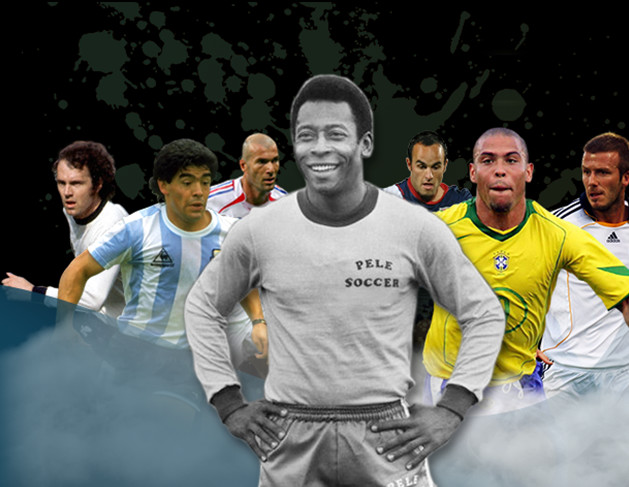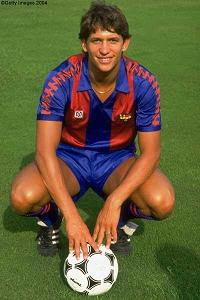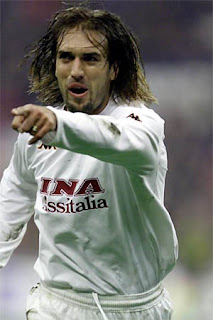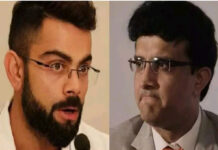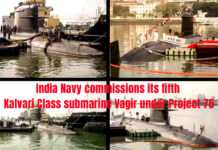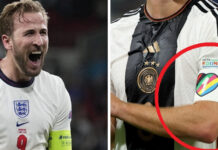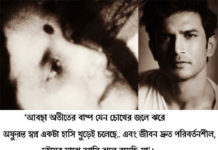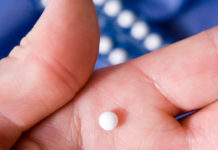GERD MULLER

Gerhard “Gerd” Müller; born 3 November 1945 in Nördlingen) is a former (West) German football player and one of the most prolific goalscorers of all time.
With national records of 68 goals in 62 international appearances, 365 goals in 427 Bundesliga games and the international record of 66 goals in 74 European Club games, he was one of the most successful goalscorers of his era. Müller is now 8th on the list of all time international goalscorers. His nicknames are “Bomber der Nation” (the nation’s Bomber) and “kleines dickes Müller” (Small thick Müller, declension intentionally wrong).
In 1970 Müller was elected European Footballer of the Year after a successful season at Bayern Munich and scoring 10 goals at the 1970 FIFA World Cup. Before the goal scored by Ronaldo against Ghana in the Round of 16 of the 2006 FIFA World Cup, Müller held the all-time goal-scoring record in the tournament, with a 14-goal total.
Honors
Titles with Bayern Munich
- Bundesliga: 1969, 1972, 1973, 1974
- German Cup: 1966, 1967, 1969, 1971
- European Champions’ Cup: 1974, 1975, 1976
- Intercontinental Cup: 1976
- Cup Winners’ Cup: 1967
Titles with the national team
- European Championship: 1972
- World Cup: 1974
Personal honours
- German top scorer: 1967, 1969, 1970, 1972, 1973, 1974, 1978
- European top scorer: 1970, 1972
- World Cup top scorer: 1970
- European Championship top scorer: 1972
- Eurochampionscup Topscorer 1973 ,1974 ,1975 ,1977
- German Footballer of the Year: 1967, 1969
- Voted best Player 40 Years Bundesliga 1963-2003
- European Footballer of the Year: 1970
- World Football’s Greatest Goalscorer of All Time (awarded in 2000)
Named to FIFA 100
Luís Filipe Madeira Caeiro Figo

(born 4 November 1972 in Almada) is a former Portuguese footballer who played as a midfielder for Sporting Clube de Portugal, FC Barcelona, Real Madrid, and Internazionale during a career which spans over 20 years. He retired from football on 31 May 2009. He won 127 caps for the Portuguese national football team.
Figo was the 2000 European Footballer of the Year, the 2001 FIFA World Player of the Year, and was named amongst the FIFA 100.
Figo is one of the few footballers to have played for both the Spanish rival clubs FC Barcelona and Real Madrid, he had a successful career highlighted by several trophy wins, such as one Portuguese Cup, four Liga titles, two Spanish Cups, three Spanish Super Cups, one UEFA Champions League title, one UEFA Cup Winners’ Cup, two UEFA Super Cups, one UEFA-CONMEBOL Intercontinental Cup, four Serie A titles, one TIM Italian Cup and three Italian Super Cups.
Club playing honours
- Sporting CP
- Cup of Portugal: 1995
- SuperCup Cândido de Oliveira: 1995
- FC Barcelona
- La Liga: 1997-98, 1998-99
- Copa del Rey: 1997, 1998
- Supercopa de España: 1996
- UEFA Cup Winners’ Cup: 1997
- UEFA Super Cup: 1997
- Copa Catalunya: 2000
- Joan Gamper Trophy: 1996, 1997, 1998, 1999
- Real Madrid
- La Liga: 2000-01, 2002-03
- Supercopa de España: 2001, 2003
- UEFA Champions League: 2002
- UEFA Super Cup: 2002
- Intercontinental Cup: 2002
- Serie A: 2005-06, 2006-07, 2007-08, 2008-09
- Coppa Italia: 2006
- Supercoppa Italiana: 2005, 2006, 2008
International playing honours
- Portugal National Football Team
- FIFA World Cup: (4th Place) 2006
- European Football Championship: (runner-up) 2004, (3rd Place) 2000
- FIFA U-20 World Cup: 1991
Individual playing honours
- Ballon d’Or: 2000
- FIFA World Player of the Year: 2001
- FIFA World Player of the Year: (runner-up) 2000
- Onze d’Or: (runner-up) 2000
- FIFA World Cup All-Star Team: 2006
- FIFA 100
- UEFA Team of the Year: 2003
- Don Balón Award Foreign Player of the year in La Liga : 1999, 2000, 2001
- Portuguese Footballer of the Year: 1995, 1996, 1997, 1998, 1999, 2000
- Portuguese Golden Ball: 1994
Best Portuguese player in the past five years (A Bola)
JAY JAY OKOCHA
Augustine Azuka “Jay-Jay” Okocha(born 14 August 1973 in Enugu) is a Nigerian former footballer who played as an attacking midfielder. He is known for his stepovers, skill and technique.
Honors
- Oberliga Südwest: 1991
- Saarland Cup: 1990, 1992
- Fuji-Cup: 1992
- Turkish Super League: 1996
- Chancellor Cup: 1998
- Atatürk Cup: 1998
- Trophée des Champions : 1998
- UEFA Intertoto Cup: 2001
- Football League Cup: Runner-Up: 2004
- Premier League Asia Trophy: 2005
- Football League Championship play-off: 2008
International Honors
- African Cup of Nations: 1994
- Afro-Asian Cup of Nations: 1995
- Olympic Games: 1996
- World Cup
- Round of 16: 1994, 1998
Individual Honours
Okocha never won the African Player of Year award, becoming arguably the best player never to win the award despite coming second twice in 1998 & 2004. He did however win the inaugural BBC African Footballer of the Year and the successive one, becoming the only player to retain the award and win it more than once. In 2004 he was listed in football legend Pelé’s FIFA 100 (a list of the greatest 125 living players of all time). In 2007 he was voted number 12 on the greatest African footballers of the past 50 years list, on a poll conducted by CAF to coincide with their 50th anniversary.
GARY LINEKER
Gary Winston Lineker OBE (born 30 November 1960) is a retired English international football striker and is currently a sports broadcaster for the BBC and Eredivisie Live. He remains England’s top scorer in the World Cup finals, with 10 goals.
Lineker began his football career at Leicester City and became known as a prolific goalscorer, finishing as the First Division’s joint top goalscorer in 1984-85 and earning his first England cap. He moved to Everton where he remained a clinical finisher, scoring 38 goals in 52 games. His first team honours came at FC Barcelona where he won the Copa del Rey in 1988 and the European Cup Winners’ Cup in 1989. He returned to England in 1989, joining Tottenham Hotspur, and over three seasons he scored 67 goals in 105 games and won the FA Cup. Lineker’s final club was Nagoya Grampus Eight and he retired in 1994 after two seasons at the Japanese side.
Lineker made his England debut in 1984 and over the following eight years earned 80 caps and scored 48 goals, finishing as England’s all-time second highest scorer. His international goals-to-games ratio remains one of the best for the country and he is regarded as one of the all-time best English strikers. He was top scorer in the 1986 World Cup and received the Golden Shoe, the only time an Englishman has achieved this feat. He is also the only player to have won the English golden boot with 3 different clubs (Leicester City, Everton and Tottenham Hotspur). During his professional career, Lineker is noted for never having been cautioned or sent off by a referee.
After his retirement from football he was inducted into the English Football Hall of Fame. He moved in to broadcasting, working at the BBC, presenting Match of the Day among other programmes. He led a consortium that invested in his old club Leicester, saving it from bankruptcy, and was appointed honorary vice-president. Since 1994, Lineker has featured in several television commercials for Walkers Crisps. He has four sons with his ex-wife Michelle and is now married to model Danielle Bux.
Honours
FC Barcelona
- Copa del Rey: 1988
- UEFA Cup Winners’ Cup: 1989
Tottenham Hotspur
- FA Cup: 1991
Individual
- English league top scorer: 1985, 1986, 1990
FIFA World Cup – Golden Shoe: 1986 (Mexico)
PAVEL NEDVED
 Pavel Nedvěd; born August 30, 1972 in Cheb) is a retired Czech football midfielder. He is one of the most successful Czech players to have played in a top European league, winning numerous accolades with Lazio and Juventus. Widely regarded as one of the best midfielders the Czech Republic has produced in the modern era, he was the recipient of the prestigious Ballon d’Or in 2003 while at Juventus. He is known for his energy and tireless runs as well as his goal scoring ability.
Pavel Nedvěd; born August 30, 1972 in Cheb) is a retired Czech football midfielder. He is one of the most successful Czech players to have played in a top European league, winning numerous accolades with Lazio and Juventus. Widely regarded as one of the best midfielders the Czech Republic has produced in the modern era, he was the recipient of the prestigious Ballon d’Or in 2003 while at Juventus. He is known for his energy and tireless runs as well as his goal scoring ability.
Nedvěd retired after the 2008-09 season after 19 years as a professional.
Honours
- Czechoslovak League: 1992-93
- Czech Gambrinus Liga: 1993-94, 1994-95
- Czech Republic Football Cup: 1996 Lazio
- Serie A: 1999-00
- Coppa Italia: 1997-98, 1999-00
- Supercoppa Italiana: 1998, 2000
- UEFA Cup Winners’ Cup: 1998-99
- UEFA Super Cup: 1999
- UEFA Cup Runner-Up 1997-1998 Juventus
- Serie A:2001-02, 2002-03 2004-05 2005-06**
- Supercoppa Italiana: 2002, 2003
- Serie B: 2006-07
- Runner-Up: Uefa Champions League 2002-2003
- Runner-Up:Coppa Italia 2003-2004
- This last two Scudetto titles were revoked due to the Calciopoli scandal, the first one was left without a champion and the second was given to Inter. Czech Republic National Team
- Runner-Up EURO 1996
- Third Place EURO 2004
Individual
- Serie A Footballer of the Year: 2003
- Serie A Foreign Footballer of the Year: 2003
- Ballon d’Or: 2003
- Champions League Best Midfielder: 2003
- Sportske Novosti award: 2003
- Czech Player of the Decade: 2003
- Czech Player of the Year: 1998, 2000, 2001, 2003, 2004, 2008
- Golden Foot: 2004
- FIFA 100
UEFA Team of the Year: 2003, 2004, 2005.
GEORGE BEST
George Best (22 May 1946 – 25 November 2005) was a Northern Irish professional football player, best known for his years with Manchester United. He was a winger whose game combined pace, acceleration, balance, two-footedness, goalscoring and the ability to beat defenders. In 1968, his annus mirabilis, he won the European Cup with Manchester United, and was named the European Footballer of the Year. When fit, he was an automatic choice for the Northern Ireland team, but he was unable to lead them to the World Cup qualification, despite being capped 37 times and scoring nine goals.
In 1999, he was voted 11th at the IFFHS European Player of the Century election, and 16th in the World Player of the Century election. Pelé named him as one of the 125 best living footballers in his 2004 FIFA 100 list and Best was named 19th, behind Gerd Müller, at the UEFA Golden Jubilee Poll. In his native Northern Ireland the admiration for him is summed up by the local saying: “Maradona good; Pelé better; George Best.”
He was one of the first celebrity footballers, but his extravagant lifestyle led to problems with alcoholism which curtailed his playing career and eventually led to his death in November 2005 at the age of 59. His cause of death was a kidney infection, a side-effect of the immuno-suppressive drugs he was required to take after a liver transplant. GQ named him as one of the 50 most stylish men of the past 50 years
Career honours
With Manchester United:
- Football League First Division winners medal, 1965 & 1967
- UEFA European Cup winners medal, 1968Personal:
- European Footballer of the Year, 1968
- Football Writers’ Association Footballer of the Year, 1968
- Professional Footballers Association: ALL STAR Award Winner Division 2 (Fulham) 1977
- Freeman of Castlereagh, 2002
- Inaugural inductee into the English Football Hall of Fame, 2002
- Honorary doctorate from Queen’s University Belfast, 2001
PFA Special Merit Award, for his services to football, 2006
MARCO VAN BASTEN
- Marcel “Marco” van Basten(31 October 1964) is a Dutch football manager and former head coach of Eredivisie side AFC Ajax and the Dutch national team. Previously, he was a football player who played for Ajax and A.C. Milan in the 1980s and early 1990s. He is regarded as one of the finest forwards of all time and scored 277 goals in a career cut short by injury. Known for his strength on the ball, his tactical awareness and spectacular strikes and volleys, van Basten was named European Footballer of the Year three times (1988, ’89 and ’92) and FIFA World Player of the Year in 1992. Van Basten was voted eighth in a poll organised by the French weekly magazine France Football consulting their former Ballon d’Or winners to elect the Football Player of the Century.
Honours
Club honours
Ajax
- UEFA Cup Winners Cup
- Winner (1): 1987
- Dutch Championship
- Winner (3): 1981–82, 1982–83, 1984–85
- Dutch Cup
- Winner (3): 1983, 1986, 1987Milan
- European Cup (now called: UEFA Champions League)
- Winner (2): 1989, 1990
- Intercontinental Cup
- Winner (2): 1989, 1990
- European Supercup
- Winner (2): 1989, 1990
- Serie A
- Winner (3): 1987–88, 1991–92, 1992–93
- Italian Super Cup
- Winner (3): 1988, 1992, 1993International honours
- UEFA European Championship
- Winner (1): 1988Individual honours
- FIFA World Player of the Year: 1992
- World Soccer Player of the Year: 1988, 1992
- UEFA Best Player of the Year: 1989, 1990, 1992
- IFFHS Best Player of the Year: 1988, 1989, 1990
- Onze d’Or: 1988, 1989
- Onze d’Argent: 1987, 1992
- Bravo Award: 1987
- UEFA European Championship 1988 Top Scorer and Best Player with 5 goals
- European Footballer of the Year: 1988, 1989, 1992
- Dutch Footballer of the Year: 1984–85
- FIFA 100 (List of the greatest living footballers picked by Pelé): 2004
- European Golden Boot: 1985–86
- European Silver Boot: 1983–84
- European Cup Top Scorer: 1989
- European Cup Silver Top Scorer: 1993
- Dutch League Top Scorer: 1983–84, 1984–85, 1985–86, 1986–87
- Serie A Top Scorer: 1989–90, 1991–92
- Serie A Silver Top Scorer: 1988–89
- World Golden Boot: 1985–86
JOHAN CRUYFF
- Hendrik Johannes Cruijff( Johan Cruijff ); born 25 April 1947), commonly known as Johan Cruyff, is a former Dutch footballer and manager. He was named European Footballer of the Year three times (1971, 1973, 1974) which is a record jointly held with Michel Platini, and Marco van Basten. Cruyff was the most famous exponent of the football philosophy known as Total Football,explored by Rinus Michels and is widely regarded as one of the greatest players of all time.
After his retirement from playing in 1984, Cruyff became highly successful as manager of AFC Ajax and later FC Barcelona; he remains an influential advisor to both clubs. His son, Jordi, also went on to play football professionally.
In 1999, Cruyff was voted European Player of the Century in an election held by the IFFHS, and came second, behind Pelé in their World Player of the Century poll. He came third in a vote organised by the French weekly magazine France Football consulting their former Ballon d’Or winners to elect their Football Player of the Century.Honours
As player
Ajax - Eredivisie: 1966, 1967, 1968, 1970, 1972, 1973, 1982, 1983
- KNVB Cup: 1967, 1970, 1971, 1972, 1983
- European Cup: 1971, 1972, 1973
- Intercontinental Cup: 1972
- UEFA Super Cup: 1972, 1973
- Intertoto Cup: 1968FC Barcelona
- La Liga: 1974
- Copa del Rey: 1978Feyenoord
- Eredivisie: 1984
- KNVB Cup: 1984
- European Player of the Century XX IFFHS
- Golden Player of the Netherlands As managerAjax
- KNVB Cup: 1986, 1987
- UEFA Cup Winners’ Cup: 1987
- FC Barcelona
- Copa del Rey: 1990
- La Liga: 1991, 1992, 1993, 1994
- UEFA Cup Winners’ Cup: 1989
- European Cup: 1992
UEFA Super Cup: 1992
Individual
- European Footballer of the Year: 1971, 1973, 1974
- FIFA World Cup Golden Ball: 1974
- FIFA World Cup All-Star Team: 1974
- Dutch Golden Shoe: 1984
- World Soccer Awards Manager of the Year: 1987
Coach of the Year: 1992, 1994
GEORGE WEAH
 George Tawlon Manneh Oppong Ousman Weah (born 1 October 1966 in Monrova) is a Liberian politician and former football forward. He spent 14 years of his professional football career playing for clubs in France, Italy, and England, winning titles in two of the three countries. In 1995, he was named FIFA World Player of the Year, European Footballer of the Year, and African Footballer of the Year. Weah has since become a humanitarian and politician in Liberia, and ran unsuccessfully in the 2005 Liberian presidential election, losing to Ellen Johnson-Sirleaf in the second round of voting. Weah is the only FIFA World Player of the Year who failed to qualify for FIFA World Cup with his national team.
George Tawlon Manneh Oppong Ousman Weah (born 1 October 1966 in Monrova) is a Liberian politician and former football forward. He spent 14 years of his professional football career playing for clubs in France, Italy, and England, winning titles in two of the three countries. In 1995, he was named FIFA World Player of the Year, European Footballer of the Year, and African Footballer of the Year. Weah has since become a humanitarian and politician in Liberia, and ran unsuccessfully in the 2005 Liberian presidential election, losing to Ellen Johnson-Sirleaf in the second round of voting. Weah is the only FIFA World Player of the Year who failed to qualify for FIFA World Cup with his national team.
Football career
At the pinnacle of success, Weah moved to Europe in 1988 when he was signed by Arsène Wenger, the manager of Monaco, who Weah credits as an important influence on his career. At Monaco, Weah was a member of the team that won the French Cup in 1991. In the 1990s Weah subsequently played for Paris Saint Germain (1992 – 95), with whom he won the French league in 1994; and AC Milan (1995 – 1999), with whom he won the Italian league in 1996 and 1999, and became the top scorer of the UEFA Champions League 1994–95. In 1995 he was named European Footballer of the Year and FIFA World Player of the Year. After leaving Milan in January 2000 Weah moved to Chelsea, Manchester City and Olympique Marseille in quick succession, before leaving Marseille in May 2001 for Al Jazira FC, in the United Arab Emirates.
As successful as he was at club level, Weah was not able to bring over that success to the Liberian national team. He has done everything with the squad from playing to coaching to financing it, but failed to qualify for a single World Cup, falling just a point short in qualifying for the 2002 tournament. This has all led to Weah being known as one of the best footballers never to have played in a World Cup.
World Best Player 1995
Weah was named world best for 1995, becoming the only African player to win the award. He was the fifth recipient of the award. The Silver trophy was won by Paolo Maldini, and the Bronze by Jürgen Klinsmann. The other four recipients were: Lothar Matthaus ’91, Marco Van Basten ’92, Roberto Baggio ’93, and Romario in ’94. Weah also won the silver trophy the following year which was won by Brazilian striker Ronaldo. Alan Shearer was awarded the Bronze.
African Player of the Year 1989, 1994 and 1995
Weah won the African player of the year in 1989 when he was with AS Monaco and 1995 with AC Milan. That year he won almost every award a footballer could win. When he won the award in 1989, it was his first major award and he took it back home for the entire country to celebrate, similar to what he did when he won the world best title and the Onze Mondial title.
European Player of the Year 1995
Weah won the European Player of the Year in 1995, becoming the only African to win the award. Sports writers from all over Europe voted and awarded Weah as the best player in Europe for the year.
Onze Mondial 1995
African Player of the Century
Weah was voted the African player of the Century by sport journalists from all around the world. This award puts Weah in the company of some of the greatest player to ever played the game. Pelé won the same award as the South American player of the Century and Johan Cruijff as the European player of the century.
PAOLO ROSSI
Paolo Rossi (born 23 September 1956 in Prato) is an Italian former football striker. In 1982, he led Italy to the 1982 FIFA World Cup title, scoring six goals to win the Golden Boot/top scorer honors, and the Golden Ball. Rossi is the only player to have won all three honours at a single tournament. Javier Saviola, Lionel Messi and Sergio Aguero accomplished this in junior teams, in the 2001, 2005 and 2007 U-20 FIFA World Cups respectively. He is listed among Pelé’s 125 all-time greatest footballers.
MICHEL PLATINI
Michel François Platini (born June 21, 1955 in Jœuf, France) is a French former football player, manager and current president of UEFA. Platini was a member of the French national team that won the 1984 European Championship, a tournament in which he was voted the best player and top goalscorer. He participated in the 1978, 1982 and 1986 World Cups, reaching the semi-finals in the latter two. Platini, Alain Giresse, Luis Fernández and Jean Tigana together made up the “carré magique” (French for “magic square”), the group of midfield players that formed the heart of the French national team throughout the 1980s. He is also widely regarded as one of the best passers in football history as well as one of history’s greatest free kick specialists and finishers. He holds the record for most goals (9) scored in European Championship final tournaments despite only appearing in one such tournament (1984). Despite being a midfielder, he held the national team top scorer record until striker Thierry Henry surpassed the 41 goals mark in 2008.
Platini was named Chevalier (Knight) of the Legion of Honour on April 29, 1985 and became Officier (Officer) in 1988. He was the French national team coach for four years, and was the co-organizer of the 1998 World Cup in France. He has also been the chairman of the FIFA Technical and Development Committee, and vice-president of the French Football Federation.
Honours
Individual honours
- 1976
- France Football French Player of the Year
- 1977
- France Football French Player of the Year
- L’Équipe French Champion of Champions
- 1979
- Selected in FIFA XI to play Argentina
- 1982
- Selected in Europe team to face FIFA XI in charity match for UNICEF
- 1983
- Capocannoniere (top scorer) in Italian championship (16 goals)
- Coppa Super Clubs player of the tournament
- Chevron Award (best goal per game ratio in Italian league)
- European Footballer of the Year
- Onze d’Or
- 1984
- Capocannoniere (top scorer) in Italian championship (20 goals)
- European Championship player of the tournament
- European Championship top goalscorer (9 goals)
- European Footballer of the Year
- Guerin Sportivo magazine’s player of the Italian championship
- L’Équipe French Champion of Champions
- Onze d’Or
- World Soccer Player of the Year
- 1985
- Capocannoniere (top scorer) in Italian championship (18 goals)
- Chevron Award (best goal per game ratio in Italian league)
- European Cup top scorer (7 goals)
- Knight of the Legion of Honour
- European Footballer of the Year
- Onze d’Or
- Intercontinental Cup Man of the match
- World Soccer Player of the Year
- 1987
- English Football League Centenary Classic match, Man of the Match
- 1988
- Officer of the Legion of Honour
- 1991
- El País European Coach of the Year
- World Soccer Manager of the Year
- 1992
- Winter Olympics, Albertville, France, lighter of the Olympic Flame with François-Cyrille Grange
- 2003
- Artemio Franchi Prize
- 2004
- Named in FIFA 100
- 2007
- Elected UEFA President.
Club honours
- Nancy
- 1975 French second division champion
- 1978 French Cup winner
- Saint-Étienne
- 1981 French league champion
- 1981 French Cup runner-up
- 1982 French Cup runner-up
- Juventus
- 1983 Italian Cup winner
- 1983 European Cup runner-up
- 1984 European Cup Winners’ Cup winner (first French player to win the trophy)
- 1984 European Super Cup winner
- 1984 Italian league champion
- 1985 European Cup winner
- 1985 Intercontinental Cup winner
- 1986 Italian league champion
International honours
- 1984 European Championship winner
- 1985 Artemio Franchi Trophy winner
- 1986 World Cup third place
- 1976 Pre-Olympic Zone European
During Platini’s international career, France were five times holders of Nasazzi’s baton, and Platini was captain on the third, fourth, and fifth occasion that the French national team held the unofficial title while he was an international.
ZINEDINE ZIDANE
Zinedine Yazid Zidane; born 23 June 1972 in Marseille), popularly nicknamed Zizou, is a French former professional footballer. He played for club teams in France, Italy and Spain, and was a member of the French national team. His career accomplishments include helping France win the 1998 FIFA World Cup and UEFA Euro 2000, in addition to winning the 2002 UEFA Champions League as a galactico with Real Madrid.
One of only two three-time FIFA World Player of the Year winners, Zidane was also named the European Footballer of the Year in 1998. His abilities were further recognized in 2004 when he was included in Pelé’s choice list of the world’s greatest footballers and is widely considered as one of the best players ever. He retired
from professional football after the 2006 FIFA World Cup.
Honours
Bordeaux
- UEFA Intertoto Cup: 1995
Juventus
- Serie A: 1996-97, 1997-98
- Italian Super Cup: 1997
- European Super Cup: 1996
- Intercontinental Cup: 1996
- UEFA Intertoto Cup: 1999
Real Madrid
- La Liga: 2002-03
- Spanish Super Cup: 2001, 2003
- UEFA Champions League: 2001-02
- European Super Cup: 2002
- Intercontinental Cup: 2002
International
- FIFA World Cup: 1998
- UEFA European Championship: 2000
Individual

Ballon d’Or awarded to Zidane in 1998.
- Ligue 1 Best Young Player – 1994
- Ligue 1 Best Player – 1996
- UEFA Champions League Best Midfielder – 1998
- Ballon D’or – 1998
- UEFA Euro Player of the Tournament – 2000
- Serie A Foreign Footballer of the Year – 1997, 2001
- Serie A Footballer of the Year – 2001
- Onze d’Or – 1998, 2000, 2001
- French Player of the Year – 1998, 2002
- UEFA Club Footballer of the Year – 2002
- Don Balón Award Foreign Player of the year in La Liga – 2002
- UEFA Team of the Year – 2001, 2002, 2003
- FIFA World Player of the Year – 1998, 2000, 2003
- UEFA Golden Jubilee Poll – 2004
- FIFA 100
- UEFA European Championship Team of the Tournament – 2000, 2004
- FIFA World Cup Golden Ball – 2006
- FIFA World Cup All-Star Team – 1998, 2006
- FIFPro World XI All-Star Team – 2005, 2006
ERIC CANTONA
Eric Daniel Pierre Cantona(born 24 May 1966) (English pronunciation: /ˈkæntənɑː/) is a French former footballer of the late 1980s and 1990s, turned actor. He ended his professional footballing career at Manchester United where he won four Premier League titles in five years, including two League and FA Cup Doubles.
Cantona is often regarded as having played a major talismanic role in the revival of Manchester United as a footballing powerhouse and he enjoys iconic status at the club and in English football. In 2001, he was voted their player of the century, and to this day United fans refer to him as “King Eric”. He is the current manager of the France beach soccer team.
Following his retirement from football, he took up a career in cinema and had a cameo role in the 1998 film Elizabeth, starring Cate Blanchett.
Honours
Marseille
- Ligue 1 (2): 1989, 1991
- Coupe de France (1): 1989
Montpellier
- Coupe de France (1): 1990
Leeds United
- Football League First Division (1): 1991-92
- Charity Shield (1): 1992
Manchester United
- Premier League (4): 1992-93, 1993-94, 1995-96, 1996-97
- FA Cup (2): 1993-94, 1995-96
- Charity Shield (3): 1993, 1994, 1996
Individual
- PFA Players’ Player of the Year
- 1994
- FWA Footballer of the Year
- 1996
ROGER MILLA
Roger Milla (born Albert Roger Mooh Miller, May 20, 1952) is a Cameroonian former football forward. He was one of the first African players to be a major star on the international stage. He played in three World Cups for the Cameroon national team. He achieved international stardom at 38 years old, an age at which most footballers have retired, by scoring four goals at the 1990 World Cup and helping the Cameroon team reach quarterfinals. He was named one of the 125 greatest living football players in 2004 by the legendary Brazilian football player Pelé.
Club career
Born in the Cameroonian capital of Yaoundé, he moved constantly as a child because of his father’s railroad job. He signed for his first club in Douala as a 13-year-old. At 18, he won his first league championship with another Douala club.
In 1976, by which time he had moved to Tonnerre Yaoundé and was awarded the African Footballer of the Year award.
In 1977, he was lured to Europe by the French club Valenciennes. However, he was kept on the reserves for two years. In 1979, he joined AS Monaco, but shuttled between the reserves’ bench and the injury list. The next year, he joined Bastia, but still did not flourish. He finally found stardom at Saint-Etienne in 1984; he then starred for Montpellier from 1986 to 1989, and became a member of the club’s coaching staff after retiring from French football.
ZICO
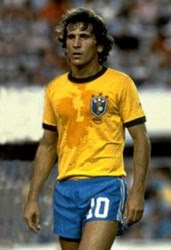 Arthur Antunes Coimbra; born 3 March 1953 in Rio de Janeiro), better known as Zico , is a Brazilian coach and former footballer. Often called the White Pelé, he is commonly considered one of the most skilled dribblers and finishers ever and possibly the world’s best player of the early 80’s. He was also known as one of history’s greatest free kick specialists, able to bend the ball with pace and accuracy as well as having an extremely powerful shot. The gifted midfielder was named by Pelé as one of the top 125 greatest living footballers in March 2004. Also according to Pelé, generally considered the best footballer ever, “throughout the years, the one player that came closest to me was Zico”.
Arthur Antunes Coimbra; born 3 March 1953 in Rio de Janeiro), better known as Zico , is a Brazilian coach and former footballer. Often called the White Pelé, he is commonly considered one of the most skilled dribblers and finishers ever and possibly the world’s best player of the early 80’s. He was also known as one of history’s greatest free kick specialists, able to bend the ball with pace and accuracy as well as having an extremely powerful shot. The gifted midfielder was named by Pelé as one of the top 125 greatest living footballers in March 2004. Also according to Pelé, generally considered the best footballer ever, “throughout the years, the one player that came closest to me was Zico”.Zico scored 52 goals in 72 international matches for Brazil, and represented them in the 1978, 1982 and 1986 World Cups. They didn’t win any of those tournaments, even though the 1982 squad is considered one of the greatest Brazilian national squads ever – along with the one that won the 1970 World Cup. Zico is often considered one of the best players in football history not to have been on a World Cup winning squad. He was chosen 1983 Player of the Year.
Zico has coached the Japanese national team, appearing in the 2006 FIFA World Cup and winning the Asian Cup 2004, and Fenerbahce, who were a quarter-finalist in 2007-08 in the Champions League under his command. He was announced as the head coach of CSKA Moscow in January 2009.
Major achievements
Club honours
- Rio State Championship 1972, 1974, 1978, 1979, 1979 (special), 1981, 1986
- Brazilian Championship 1980, 1982, 1983, 1987
- Libertadores Cup 1981
- Intercontinental Cup 1981
- J.League 1st Stage Championship 1993
International honours
- 1978 FIFA World Cup: Third place
- 1982 FIFA World Cup: Round 2 (5th place)
- 1986 FIFA World Cup: Quarter-finals (5th place)
GABRIEL BATISTUTA
- Gabriel Omar Batistuta (born February 1, 1969), nicknamed Batigol, is a former professional footballer. The prolificArgentine striker played most of his club football at in Fiorentina Italy, and he is the eighth top scorer of all time in the Italian Serie A league, with 184 goals in 318 matches between 1991 and 2003. On the international level, he is the all-time highest scorer for Argentina’s national team, with 56 goals in 78 national team matches, and he represented his country at three FIFA World cups. In 2004, he was named in the FIFA 100 list of the “125 Greatest Living Footballers”.
When his club Fiorentina was relegated to Serie B in 1993, Batistuta stayed with the club and helped it return to the top-flight league a year later. A popular sporting figure in Florence, the Fiorentina fans erected a life-size bronze statue of him in 1996, in recognition of his performances for Fiorentina. He never won the Italian league with Fiorentina, but when he moved toRoma in 2000, he finally won the Serie A championship to crown his career in Italy. He played his last professional season in Qatar with Al-Arabi before he retired in 2005.
During the 2006 FIFA World Cup, he worked as a commentator for Televisa Deportes.
Honours
- Serie A (Division 1.) Italian Championship (with Roma) 2000-2001.
- Italian Supercup (with ACF fiorentina) 1996, (with Roma) 2001
- Argentine Football Writers’ Footballer of the Year 1998.
- Italian cup(with Fiorentina) 1995-1996.
- Serie A Capocannoniere (Top Scorer), 26 goals (with Fiorentina) 1994-1995
- Coppa Italia Top Scorer (8 goals) 1995-1996
- Copa América (with Argentina) 1991, 1993
- Copa América Top Scorer, 6 goals (with Argentina) 1991
- Top Scorer of The Qatari League with a record breaking 25 goals in 21 games.
- Top Scorer in all Arab leagues, awarded with a Golden Boot.
- Gabriel Batistuta set a new Serie A record by scoring in 11 consecutive Serie A games
- Top goalscorer for Argentina (56 goals)
- Top goalscorer for Fiorentina (168 goals)
- Serie A 8th Top Goalscorer of all times with 184 goals
- Confederations Cup (with Argentina) 1992
- FIFA 100
- FIFA World Player of the Year 3rd Place 1999
DIEGO MARADONA

Diego Armando Maradona 1960-, Argentinian soccer star. A strong forward with spectacular abilities, superb dribbling skills, and great personal flair, he began his career as a teenager playing for the Argentinos (1976-80) and Boca juniors (1981). Moving (1982) to Europe, he joined the Barcelona team and led them to the 1983 Spanish Cup. With Italy’s Napoli club from 1984, he was instrumental to their winning five championship cups. In 1991, however, he tested positive for cocaine and was suspended. Cocaine addiction subsequently plagued him, and he has been several times treated for addiction and health conditions resulting from it. He subseqently played with the Seville club (1992-93) in Spain and Newell’s Old Boys (1993) in Rosario, Argentina, but without his old fire.Maradona represented Argentina on its World Cup teams in 1982 and 1986, the latter year as a captain who dominated the games and led his team to victory with his infamous “hand of God” goal. He was again captain of the 1990 and 1994 national teams, but during the 1994 World Cup he failed another drug test (for ephedrine) and was again suspended. He attempted a comeback in 1995 with the Boca Juniors, but retired two years later after again failing a drug test. A national hero in Argentina, he has been the host of a popular TV talk show since 2005.
PELE
 Pele, a former Brazilian footballer, is thought by many to be the greatest footballer in history. Pele is his nickname; he was born in Brazil with the given name of Edison (Edson) Arantes do Nascimento on October 23, 1940. While his birth certificate reads that his first name is Edison, his preference is Edson, but Pele is the name that this sports legend is known by.
Pele, a former Brazilian footballer, is thought by many to be the greatest footballer in history. Pele is his nickname; he was born in Brazil with the given name of Edison (Edson) Arantes do Nascimento on October 23, 1940. While his birth certificate reads that his first name is Edison, his preference is Edson, but Pele is the name that this sports legend is known by.
When people think of soccer, they think of Pele. He seemed to be born to play soccer. He possessed amazing skills and seemed to make the ball do exactly what he wanted. He had astonishing speed as well as ball control. He was agile, lithe, and strong. He is well known for his unique dribbling and passing techniques. The crowd absolutely loved to watch him play; he always seemed to pull of some amazing feat every time he was in possession of the ball. His skill allowed him to score 1,283 first-class goals, 12 of which were made during World Cup tournaments, in 1958, 1968 and 1970. Pele was the only football player in the games history to claim three World Cup trophies.
It was Waldemar de Brito who discovered this incredible talent. de Brito started coaching Pele in 1954 and in only two years, Pele played his first professional match at the age of 16. A year later, Pele was in a starting position on Santos. He won his first World Cup at seventeen and by 1962, Pele was receiving regular offers of positions on European football teams. However, a move overseas was not in the cards for Pele – the Brazilian government declared him a national treasure, which barred his joining a foreign football club.
Pele continued playing for Santos until the end of his 17th season in 1972. He retired from football but would occasionally suit up during competitive matches. At the start of the 1975 season, he came out of this semi-retirement to play for the New York Cosmos who were part of the North American soccer League. Although many considered him to be past his prime, Pele was responsible for greatly increasing the interest and public awareness of soccer in the United States. In his third and last season with the Cosmos, he led the team to win the 1977 NASL championship.
In his homeland of Brazil, he is still regarded a national hero. He is well known for his contributions and accomplishments to football and was declared the football ambassador of the world by FIFA. He vocally supports policies that will improve the conditions of the less privileged. During his legendary career, he earned the title \”The King of Football\”. His is a member of the American National Soccer Hall of Fame.He is rated as the best footballer ever by this blog[WORLD FOOTBALL LEGENDS.BLOGSPOT.COM].If any opposition post your opinion.































